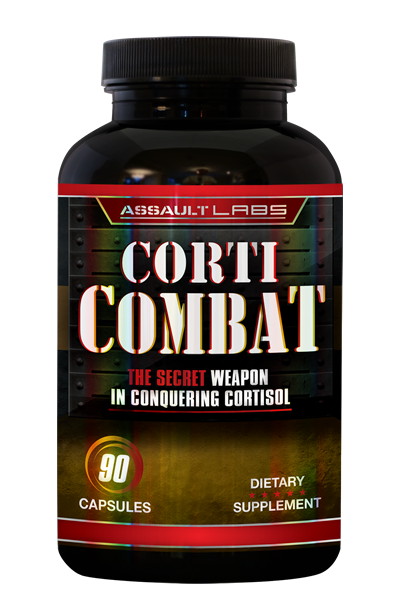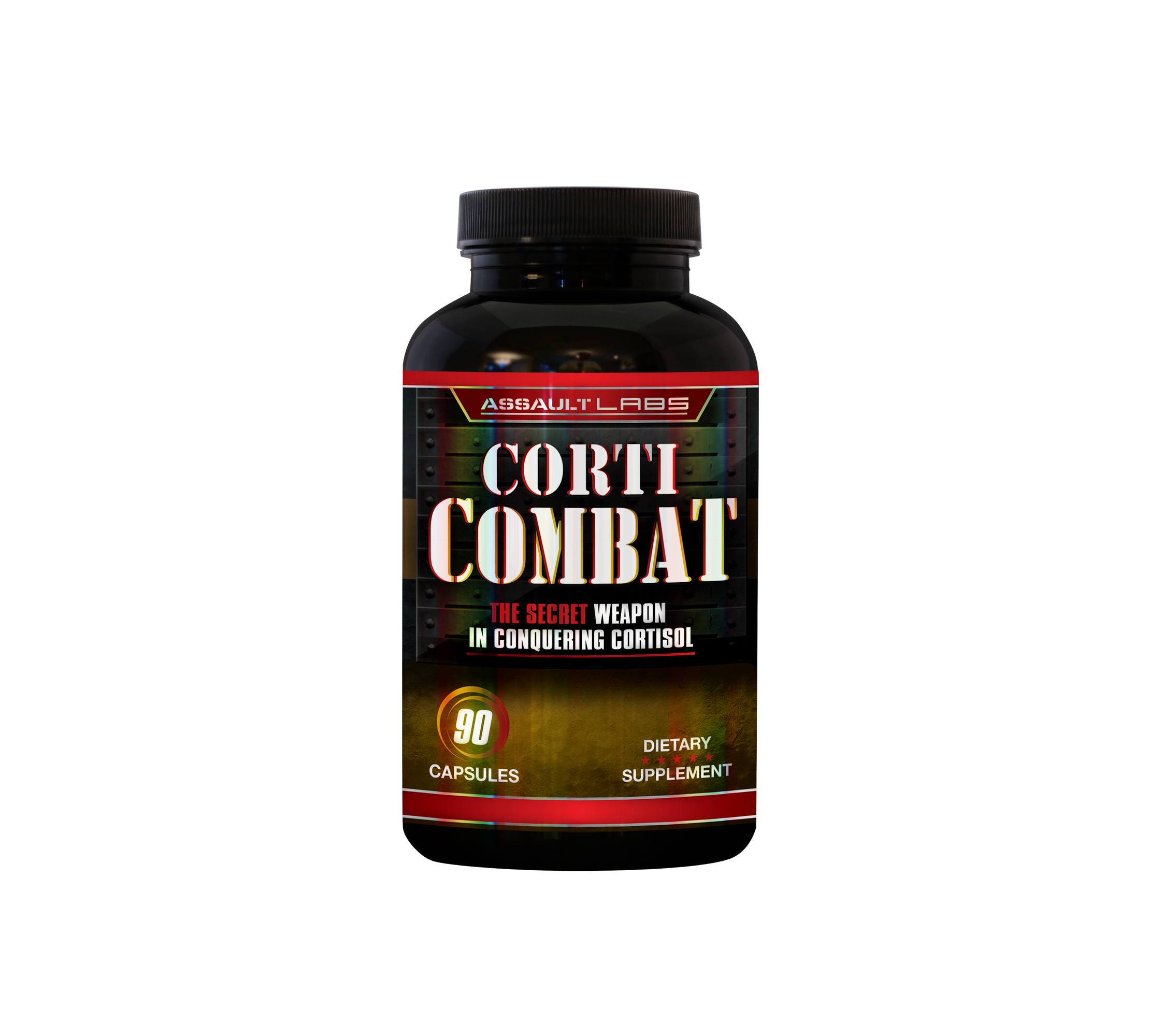The Best Supplements to Reduce Cortisol Levels and Manage Stress
Posted by Leonard Shemtob on Apr 25, 2023
The Best Supplements to Reduce Cortisol Levels and Manage Stress
The human body’s stress response is highly complex, and its impact on overall health and well-being cannot be understated. In times of high pressure and stress, cortisol production increases dramatically in order to facilitate the body’s fight-or-flight response. This can lead to a variety of both short-term and long-term health issues, such as an imbalanced gut microbiome, weakened immune system, impaired cognitive functioning, mood instability, and more.
Fortunately, there are various natural and supplemental remedies available for regulating cortisol levels. In this article, we will explore the causes and consequences of elevated cortisol, examine natural strategies for managing stress and reducing cortisol levels, discuss the potential benefits of specific supplements, and answer frequently asked questions regarding the subject matter.
Short Summary
- Cortisol is a hormone which regulates metabolic processes and the body's response to stress, and its regulation is essential for maintaining optimal health.
- Common causes of high cortisol levels include chronic stress, inadequate sleep, excessive exercise, and inadequate nutrition.
- Natural methods to reduce cortisol levels and manage stress include lifestyle modifications, dietary changes, supplements, physical activity, and relaxation techniques.
What is Cortisol and How Does it Affect Your Health?

Cortisol is a steroid hormone produced by the adrenal glands that is responsible for regulating a variety of bodily processes, such as metabolism and the immune response.It is commonly referred to as the primary stress hormone. In response to a stressful situation, cortisol is released, preparing the body for fight or flight and increasing blood sugar levels. Cortisol also aids in memory formation, regulates the sleep-wake cycle, and helps maintain homeostasis in the body.
The body's production of cortisol is regulated by an intricate network of hormones known as the Hypothalamic-Pituitary-Adrenal (HPA) axis. The hypothalamus sends a signal to the pituitary gland, prompting it to secrete adrenocorticotropic hormone (ACTH), which subsequently triggers the release of cortisol. This process is then regulated by vitamins and minerals such as vitamin B12, folate, magnesium, and vitamin C, as well as the composition of the gut microbiome.
Cortisol levels are typically highest in the morning, gradually decreasing as the day progresses. This natural circadian rhythm is disturbed by poor posture, physical exertion, and prolonged periods of stress. Prolonged exposure to high cortisol levels can result in the development of chronic illnesses such as type 2 diabetes, high blood pressure, and depression.
It is important to note that cortisol plays an important role in the body's response to stress and its regulation is essential for optimal health. Dietary and lifestyle changes, such as getting adequate sleep, eating a healthy diet, and engaging in regular exercise, can help to reduce cortisol levels. Additionally, supplements such as phosphatidylserine, ginger root extract, choline bitartrate, Ashwagandha, L-theanine, cordyceps sinensis, magnolia bark extract, and Rhodiola root have been found to be beneficial for cortisol reduction.
Common Causes of High Cortisol Levels

Cortisol is a hormone produced by the body in response to stress, and it can have a significant impact on our health if levels remain high for extended periods. Chronic stress, inadequate sleep, excessive exercise, excessive caffeine consumption, chronic health conditions or inflammation, and inadequate nutrition are all common causes of high cortisol levels. Prolonged stress has been observed to increase cortisol levels. High sugar intake can be detrimental to our health. It can result in elevated cortisol levels.
The body responds to stress by releasing cortisol, which is a hormone that plays an important role in regulating the body’s response to stress. When we experience stress or anxiety, our bodies produce cortisol, which can result in a variety of symptoms and health issues if levels remain high for extended periods. This is because cortisol is released to help us cope with the perceived threat, but when it is constantly released due to chronic stress, it can lead to negative health effects.
Chronic stress, inadequate sleep, excessive exercise, excessive caffeine consumption, chronic health conditions or inflammation, and inadequate nutrition are all common causes of high cortisol levels. Prolonged stress has been observed to increase cortisol levels. Eating too much sugar can cause cortisol levels to rise. This can have potential health risks. This can be further complicated by cortisol receptors becoming less sensitive over time, which can lead to even higher levels of cortisol.
By understanding the common causes of high cortisol levels, we can better manage our stress levels and reduce the negative effects of elevated cortisol levels. This can be accomplished through lifestyle changes such as improving sleep hygiene, engaging in regular exercise, eating a healthy diet, and practicing mindfulness and meditation. Additionally, there are certain supplements that can help to balance cortisol levels and reduce the stress hormone naturally. These include phosphatidylserine (PS), ginger root extract, choline bitartrate, ashwagandha, L-theanine, cordyceps sinensis, magnolia bark extract, rhodiola root, and 7-beta-hydroxy-dhea.
By understanding the common causes of high cortisol levels, we can better manage our stress levels and reduce the negative effects of elevated cortisol levels. With the right combination of lifestyle changes, stress management techniques, and cortisol-reducing supplements, we can help keep cortisol levels within normal range and enjoy better health and wellbeing.
The Negative Effects of Elevated Cortisol Levels

High cortisol levels can have a detrimental impact on the body, and the effects of elevated cortisol are largely negative. Excessive cortisol levels can lead to weight gain and obesity, interfere with sleep, cause mental confusion, weaken the immune system's ability to fight infection, and increase the risk of developing chronic diseases. Continuous high cortisol levels can lead to slowed cellular regeneration, destruction of healthy bone and muscle tissue, monopolization of chemicals necessary for the production of other hormones, and a weakened immune system.
In times of stress, essential bodily processes such as digestion, reproduction, and the immune system may be inhibited. Furthermore, cortisol has been shown to restrict the brain's ability to function optimally, resulting in impaired memory formation and a feeling of "brain fog". Furthermore, elevated cortisol can lead to cardiovascular problems, such as hypertension and high blood pressure.
It is important to note that cortisol is a necessary hormone and serves an important function in the body. However, when cortisol is produced in excess, it can have a negative impact on overall health. Elevated cortisol levels can have a range of detrimental effects on the body, including constriction of the arteries, weakening of the immune system, disruption of intermediary metabolism, and suppression of various bodily functions.
As such, it is important to understand the negative effects of elevated cortisol levels in order to take the necessary steps to reduce stress and cortisol levels.
Natural Ways to Reduce Stress and Cortisol

Reducing stress and cortisol levels is essential for maintaining good health and wellbeing. Stress is a normal reaction to life's challenges, but when it is experienced in excess and over prolonged periods of time, it can have negative impacts on both physical and mental health. The hormone cortisol is released in response to stress and, when left unchecked, can have serious consequences. Therefore, it is important to find natural ways to reduce stress and cortisol levels.
An effective strategy for reducing stress and cortisol levels is to make lifestyle modifications, such as engaging in stress management techniques, making dietary adjustments, and increasing physical activity. Stress management techniques, such as relaxation techniques and deep breathing exercises, can help reduce stress and cortisol levels. Eating a balanced, nutritious diet and limiting processed foods can also be beneficial in maintaining healthy cortisol levels. Lastly, regular physical activity can help to reduce stress levels and bolster the body's ability to cope with stress.
By implementing lifestyle modifications, such as stress management techniques, dietary adjustments, and physical activity, you can help to naturally reduce cortisol levels and manage stress. Additionally, supplements such as phosphatidylserine, ginger root extract, choline bitartrate, ashwagandha, l-theanine, cordyceps sinensis, magnolia bark extract, rhodiola root, and 7-beta-hydroxy-dhea can also be used to help balance cortisol levels. It is important to note that supplements alone are not sufficient and must be used in combination with lifestyle modifications for optimal results.
Sleep Hygiene
Sleep hygiene is a collection of habits and practices that are conducive to achieving a restful night's sleep. This includes establishing a consistent sleep schedule, creating a calming bedtime routine, and ensuring a comfortable sleeping environment. Adhering to these practices is essential for obtaining a good night's sleep and reducing cortisol levels. Additionally, avoiding caffeine and alcohol consumption, limiting or avoiding screens prior to bedtime, and engaging in regular physical activity can also help promote healthy sleep habits.
It is important to ensure adequate hydration by drinking water to help reduce stress levels. Eliminating or reducing processed foods and consuming nutrient-dense meals that are rich in protein, complex carbohydrates, and beneficial fats can also be beneficial in reducing cortisol levels. Additionally, consuming prebiotic-rich foods and probiotic supplements is recommended for promoting a healthy gut, as this can lead to lower cortisol levels and decreased stress.
Lastly, when feeling stressed, it is beneficial to snack on foods containing prebiotics, which are known to support digestive health. Additionally, listening to music has been found to be an effective way to reduce stress and cortisol levels. The energizing effect of this choice can be particularly advantageous for those struggling with stress and fatigue.
By following these guidelines, individuals can improve their sleep hygiene and reduce their cortisol levels.
Healthy Diet
Eating a nutritious diet is an important part of maintaining healthy cortisol levels. Certain supplements, such as omega-3 fatty acids, magnesium, B vitamins, and probiotics, have been shown to be effective in helping to regulate cortisol levels. Additionally, consuming soluble fiber has been demonstrated to be successful in lowering cortisol levels. Oranges and berries are known to be beneficial in this regard, as they contain essential vitamins and minerals.
A healthy gut can result in many benefits. For example, it can lead to lower cortisol levels and decreased stress. Consuming sea salt has been demonstrated to be an effective natural method of reducing cortisol levels in the body. A food-first approach is recommended, which may include the consumption of prebiotic-rich foods, prebiotic supplements, or a combination of prebiotics and probiotics. Consuming meals that are rich in protein, complex carbohydrates, and beneficial fats can help to reduce cortisol levels.
Eliminating or reducing processed foods and incorporating nutrient-dense foods, such as liver, fatty fish, and other sources of omega-3 fatty acids, can also be beneficial. Additionally, probiotics have been shown to reduce inflammation and bolster the immune system, which can lead to better overall health. Lastly, consuming green tea and herbal supplements can also provide health benefits, such as weight gain and improved digestion.
Exercise
Exercise is an important factor in reducing cortisol levels and managing stress. Research suggests that physical activity can significantly reduce stress and cortisol levels. Exercise helps to alleviate physical stress and can also positively impact brain function, making it an effective way to manage stress. Additionally, regular physical activity can help to strengthen muscle tissue, which is important for overall physical health.
The health benefits of exercise are not limited to reducing cortisol levels. Exercise can also help to reduce anxiety, treat depression, and improve sleep quality. Exercise has been shown to be beneficial in improving mood and brain function, as well as providing stress relief. Furthermore, exercise can help to improve cognitive performance and reduce mental fatigue.
It is important to note that the frequency, duration, and intensity of exercise should be tailored to individual needs. It is recommended that individuals engage in moderate-intensity physical activity for at least 30 minutes per day, five days per week. However, it is also important to listen to your body and rest when necessary.
Meditation
Meditation is a practice that involves honing the mind to concentrate and reach a state of serenity and relaxation. Different types of meditation exist, such as mindfulness, mantra, loving-kindness, and transcendental meditation. Meditation can be an effective tool for stress relief and cortisol reduction. Studies have shown that regular meditation can reduce cortisol levels and improve mental clarity.
In addition to providing stress relief, meditation can also improve brain health. Meditation can help reduce brain fog, boost cognitive performance, and protect brain cells from deterioration. It has also been found to be beneficial in improving sleep quality and mental alertness. Furthermore, research suggests that meditation can help to reduce mental health problems and cognitive decline.
Meditation, along with other natural methods such as music, yoga, holy basil, and reflexology, can be effective in reducing stress and cortisol levels. Listening to music has been found to be an effective way to reduce stress and cortisol levels. Regularly practicing yoga can be a great way to reduce stress levels and promote relaxation. Holy Basil has been found to be beneficial in protecting tissues and organs from pollutants and heavy metals, reducing physical stress, managing blood glucose, blood pressure and lipid levels, exhibiting anti-depressant properties, and improving brain and memory function. Reflexology has been shown to stimulate the nervous system, thus leading to a decrease in stress and tension levels.
The combination of these natural methods can be a powerful tool in managing stress and cortisol levels. By incorporating stress management techniques, dietary adjustments, physical activity, and supplements, individuals can reduce stress and cortisol levels and experience improved physical and mental wellbeing.
Supplements that Help Lower Cortisol
Supplements can be a great way to reduce cortisol levels and manage stress. Certain supplements, such as Phosphatidylserine (PS), Ginger Root Extract, Choline Bitartrate, Ashwagandha, L-Theanine, Cordyceps Sinensis, Magnolia Bark Extract, Rhodiola Root, and 7-beta-hydroxy-dhea, have been studied and found to be effective in reducing cortisol levels.
Phosphatidylserine (PS) is a phospholipid, a fatty substance naturally produced in the body, that facilitates the transmission of messages and is often used to reduce cortisol levels. It is often used to treat Alzheimer’s disease, age-associated memory impairment, cognitive impairment, and other non-cognitive conditions. Additionally, it may be employed to enhance athletic performance, manage ADHD, and reduce cortisol levels.
Ginger Root Extract is composed of a variety of compounds, including gingerols, shogaols, and zingerone. These compounds have properties that may help to reduce inflammation, which can help to lower cortisol levels. Additionally, studies have found that Ginger Root Extract may help with sleep quality, which can help regulate cortisol levels.
Choline bitartrate is a combination of choline and tartaric acid that has a higher rate of absorption than pure choline. It is known to have positive effects on brain chemistry and its effects on cortisol levels have been noted in studies. Specifically, choline bitartrate has been found to reduce cortisol levels in response to stress.
Ashwagandha is an evergreen shrub that is widely utilized to reduce stress and is a key component of Ayurvedic medicine. Studies have found that Ashwagandha may be beneficial for overall well-being. It may help to regulate cortisol levels and reduce stress. Additionally, Ashwagandha may help to reduce anxiety and improve cognitive function.
L-theanine is an amino acid commonly found in tea and certain mushrooms that has been found to be effective in moderating cortisol levels. Studies have indicated that L-theanine may help improve mood, reduce stress, and improve cognitive function. Additionally, L-theanine has been found to help regulate the body’s stress response and reduce cortisol levels.
Cordyceps sinensis is a fungus that is found in the high-altitude regions of China and Tibet. It has been used for centuries in traditional Chinese medicine and is known to have a variety of health benefits.
Phosphatidylserine (PS)
Phosphatidylserine is a phospholipid, a fatty substance naturally produced in the body, that facilitates the transmission of messages and is often used to reduce cortisol levels. It is often used to treat Alzheimer’s disease, age-associated memory impairment, cognitive impairment, and other non-cognitive conditions. Additionally, it may be employed to enhance athletic performance, manage ADHD, and reduce cortisol levels. Studies have found that the administration of phosphatidylserine can lead to an improvement in mood and cognitive function in individuals who are dealing with stress, as well as a decrease in cortisol levels following exercise-induced stress. It has also been found to reduce post-exercise muscle soreness and shorten recovery duration.
Phosphatidylserine supplements are derived from cabbage and soy. They are generally well tolerated, however it is recommended to consult a healthcare professional before taking any supplements as they can interact with certain medications.
Ginger Root Extract
Ginger Root Extract is composed of a variety of compounds, including gingerols, shogaols, and zingerone. These compounds have properties that may help to reduce inflammation, which can help to lower cortisol levels. Studies have found that Ginger Root Extract may help with sleep quality, which can help regulate cortisol levels. Additionally, Ginger Root Extract has been found to improve the perception of stress in individuals and can help to reduce cortisol levels.
Ginger Root Extract is generally well tolerated, however it is important to consult a healthcare professional before taking any supplements as they can interact with certain medications. It is available in capsule, tablet, dried powder and liquid extract forms. It is recommended to take the supplement in the recommended dosage for optimal results.
In conclusion, Ginger Root Extract is composed of compounds that have properties that may help to reduce inflammation and improve sleep quality, which can help to reduce cortisol levels. It is a safe and effective supplement for reducing cortisol levels and managing stress, and should be taken in the recommended dosage for optimal results.
Ginger Root Extract may be a beneficial supplement for those looking to reduce cortisol levels and manage stress.
Choline Bitartrate
Choline bitartrate is a combination of choline and tartaric acid that has a higher rate of absorption than pure choline. Choline is a nutrient akin to B vitamins, and is found in a variety of dietary sources such as meats, fish, nuts, beans, vegetables, and eggs. It helps to facilitate the production of phosphatidylcholine, an important lipid that is involved in various metabolic processes.
Studies have demonstrated that choline bitartrate can help improve cognitive functioning and reduce cortisol levels in individuals with mild memory issues, as well as those engaging in physical activity. Additionally, it has been found to reduce cortisol levels in response to stress. Furthermore, choline bitartrate has been observed to support healthy adrenal gland functioning and maintain healthy cortisol levels.
Choline bitartrate is generally well tolerated, however it is important to consult a healthcare professional before taking any supplements as they can interact with certain medications. It is available in capsule, tablet, and powder forms. It is recommended to take the supplement in the recommended dosage for optimal results.
Ashwagandha
Ashwagandha is an evergreen shrub that is widely utilized to reduce stress and is a key component of Ayurvedic medicine. It is known for its capacity to regulate stress and anxiety, and may have positive effects on athletic performance and sleep. Studies have demonstrated that Ashwagandha can effectively reduce cortisol levels in individuals with chronic stress, as well as improve symptoms such as anxiety and difficulty sleeping in those who have experienced significant stress in the past. The highest reduction in cortisol levels can be achieved through the consumption of 300 mg of high-concentration full-spectrum Ashwagandha root, amounting to up to 30%.
The mechanisms by which Ashwagandha helps to lower cortisol levels include reducing inflammation and oxidative stress, as well as activating certain brain receptors, resulting in a calming effect on the body during times of stress. Additionally, studies have indicated that it can reduce symptoms of depression and alleviate anxiety. Ashwagandha is available in capsule, tincture, or powder form, either as a single ingredient or combined with other calming plant compounds. It is recommended to take 30-60 days of Ashwagandha to effectively reduce cortisol levels.
L-Theanine
L-theanine is an amino acid commonly found in tea and certain mushrooms that has been found to be effective in moderating cortisol levels. It is known to promote alertness, relaxation, and sleep without inducing drowsiness, making it an ideal supplement for those looking to manage stress and cortisol levels. Research has demonstrated that L-theanine can effectively reduce stress-related symptoms and cortisol levels. Additionally, L-theanine has been found to help regulate the body’s stress response and reduce cortisol levels.
L-theanine is available in supplement form, as well as naturally in green tea, and can be taken in doses of up to 200 mg. Consuming a beverage containing 200 mg of l-theanine has been observed to lead to feelings of relaxation and a decrease in cortisol levels, with the effects lasting for up to three hours. Additionally, L-theanine has been found to help facilitate the release of dopamine and serotonin, two neurotransmitters that play an important role in regulating mood.
Studies have also indicated that L-theanine may improve cognitive function, as well as enhance focus and reduce stress, thereby improving cognitive performance. This is due to the fact that L-theanine has been found to activate the alpha waves in the brain, which helps to improve concentration. Furthermore, a study involving healthy participants revealed that those who consumed a beverage containing 200 mg of l-theanine and then completed a cognitively demanding task experienced significantly lower cortisol levels than those in the placebo group.
Cordyceps Sinensis
Cordyceps sinensis is a fungus that is found in the high mountain regions of China, typically growing on certain caterpillars. It has a long history of use in traditional Chinese and Tibetan medicine, and is commonly referred to as caterpillar fungus. Cordyceps acts as an adaptogen, helping to regulate cortisol levels. In addition to regulating cortisol levels, it is also believed to have antioxidant and immune-enhancing properties, providing a natural energy boost and helping to protect against health issues such as depression, fatigue, asthma, and upper respiratory infections. Additionally, it has been known to improve athletic performance.
Cordyceps sinensis is available in supplement form, as well as in tea, and is typically taken in doses of up to 500 mg per day. Studies have found that Cordyceps supplementation can have a positive effect on epinephrine and norepinephrine levels, indicating that it may help to reduce stress and cortisol levels. Additionally, it has been found to improve sleep quality, which can help regulate cortisol levels.
Another potential benefit of Cordyceps supplementation is its ability to reduce inflammation. Studies have found that Cordyceps has anti-inflammatory properties, which can help reduce cortisol levels and improve overall health. Additionally, cordyceps supplementation has been observed to lead to improved mood and reduced stress, which can help to reduce cortisol levels.
Magnolia Bark Extract
Magnolia bark extract is a natural substance derived from the bark of the magnolia tree, which is commonly used in beauty products and dietary supplements. Research has demonstrated that it possesses anti-inflammatory and anti-anxiety properties. These benefits can be used to reduce stress and support healthy adrenal function. Additionally, studies have found that Magnolia bark extract can help to regulate cortisol levels by impacting the Hypothalamic-Pituitary-Adrenal (HPA) axis, which is responsible for the body's stress response. This offers an increase in stamina and energy, as well as a reduction in the body's cortisol response to long-term stress.
Magnolia bark extract is available in supplement form, as well as in teas and tinctures. It is important to consult with a healthcare professional before taking any supplement to ensure its safety and efficacy. Additionally, it is important to note that Magnolia bark extract is not recommended for pregnant women, nursing mothers, or those taking certain medications.
In terms of dosage, Magnolia bark extract should be taken in doses of up to 500 mg per day. Studies have found that Magnolia bark extract is most effective when taken in the morning, as this helps to reduce cortisol levels and promote overall well-being. Additionally, Magnolia bark extract can be taken in combination with other cortisol-reducing supplements, such as Rhodiola root, for enhanced effects.
Rhodiola Root
Rhodiola root is a plant native to cold regions of Europe and Asia, and has been utilized in traditional medicine for centuries to address issues such as anxiety, fatigue, and depression. It is known to have adaptogenic properties, meaning that it helps the body adapt to stress and fatigue. Rhodiola root has been studied for its effects on cortisol levels, with studies showing that it can reduce cortisol production in response to stress. Additionally, Rhodiola root has been found to improve energy levels, mental clarity, and physical stamina, as well as decrease feelings of mental and physical fatigue.
Rhodiola root is available in supplement form and can be taken in the form of capsules, tablets, or teas. It is important to consult with a healthcare professional before taking any supplement to ensure its safety and efficacy. Additionally, it is important to note that Rhodiola root is not recommended for pregnant women, nursing mothers, or those taking certain medications.
In terms of dosage, Rhodiola root should be taken in doses of up to 400 mg per day. Studies have found that Rhodiola root is most effective when taken in the morning, as this helps to reduce cortisol levels and promote overall well-being. Additionally, Rhodiola root can be taken in combination with other cortisol-reducing supplements, such as Magnolia bark extract, for enhanced effects.
7-beta-hydroxy-dhea
7-beta-hydroxy-dhea is a dietary supplement that has been studied for its ability to reduce cortisol levels and manage stress. It has been found to be effective in moderating cortisol levels and mitigating the consequences of physical and mental strain. Additionally, 7-beta-hydroxy-dhea may help to reduce fatigue and enhance muscular recovery capacity.
7-beta-hydroxy-dhea is available in the form of capsules and tablets and is typically taken in doses of 400-800 mg per day. It is important to note that this supplement should be taken under the guidance of a healthcare professional. Additionally, it is important to note that 7-beta-hydroxy-dhea should not be taken by pregnant or nursing women, or those taking certain medications.
Studies have indicated that 7-beta-hydroxy-dhea may help to reduce cortisol levels and manage stress. Additionally, 7-beta-hydroxy-dhea may help to improve physical and mental performance, as well as reduce fatigue and enhance muscular recovery capacity. Studies have also indicated that 7-beta-hydroxy-dhea may help to reduce hot flashes among premenopausal women, as well as improve mood and cognitive function.
7-beta-hydroxy-dhea is a promising supplement for reducing cortisol levels and managing stress, and should be taken under the guidance of a healthcare professional. Additionally, it is important to note that 7-beta-hydroxy-dhea should not be taken by pregnant or nursing women, or those taking certain medications. When taken in the recommended dosage, 7-beta-hydroxy-dhea can help improve physical and mental performance, reduce fatigue, and enhance muscular recovery capacity.
FAQs

To better understand the various supplements that can help reduce cortisol levels and manage stress, let's take a look at some frequently asked questions.One common question is what are the most widely accepted methods for decreasing cortisol levels? Decreasing cortisol levels naturally can be achieved through adequate sleep, consistent exercise, and supplementation with substances such as ashwagandha and omega-3 fatty acids. Extensive research has been conducted on animals and clinical trials to assess the impact of various substances on cortisol levels in athletes under strenuous conditions. To obtain precise data, a 24-hour cortisol test is recommended.
Another common question is what is an elimination diet and how could it potentially aid in reducing cortisol levels? An elimination diet is a dietary approach that involves the removal of certain foods in order to identify food sensitivities. It may be beneficial in reducing cortisol levels. Natural medicine practitioners are qualified to perform a 24-hour cortisol test.
When it comes to managing stress levels, a healthcare practitioner can collaborate with the individual to create a plan that incorporates supplements to effectively balance stress and enhance the quality of life. It is also important to implement stress management techniques and ensure we are consuming the right foods and supplements to keep our stress levels in check. It is important to note that the long-term effects of taking these supplements are currently unknown. Additionally, signs of magnesium deficiency such as fatigue, muscle cramps, headaches, insomnia, anxiety, depression, irritability, poor concentration, and heart palpitations should be monitored.
Summary What is Cortisol and How Does it Affect Your Health?
Cortisol is a hormone that is produced by the body in response to stress and has a range of effects on health.Elevated cortisol levels can lead to a range of negative effects, such as increased risk of disease, weight gain, depression, and decreased fertility. High levels of cortisol can also impair brain function and impair the body's ability to heal and repair itself.
Fortunately, there are a number of natural strategies that can help people reduce their cortisol levels and manage stress. These strategies include improving sleep hygiene, eating a healthy diet, engaging in regular exercise, and incorporating relaxation activities such as meditation into one's daily routine. Additionally, there are many supplements available that have been proven to help reduce cortisol levels and manage stress. These include Phosphatidylserine (PS), Ginger Root Extract, Choline Bitartrate, Ashwagandha, L-Theanine, Cordyceps Sinensis, Magnolia Bark Extract, Rhodiola Root, and 7-beta-hydroxy-dhea.
By making lifestyle changes and taking certain supplements, it is possible to reduce cortisol levels and manage stress. With the right combination of lifestyle changes and supplements, anyone can balance their cortisol levels and find relief from the negative effects of chronic stress.
Common Causes of High Cortisol Levels

Cortisol is a hormone that is released in response to stress and anxiety, and can have a significant impact on our health if levels remain elevated for extended periods. Common sources of elevated cortisol levels can include chronic stress, prolonged stress, and even tumors. Cortisol is produced by the adrenal glands, and when our bodies are under stress, they can produce too much of the hormone. When cortisol levels remain high for an extended period of time, it can lead to a variety of symptoms and health issues.
Chronic stress is a major contributor to elevated cortisol levels, as it can lead to prolonged production of the hormone. This can result in a wide range of physical and mental health issues, such as fatigue, poor sleep, depression, and anxiety. Additionally, some medications, such as steroids, can also lead to elevated cortisol levels.
By understanding the common causes of high cortisol levels, we can take steps to reduce our stress and manage our cortisol levels more effectively. We can do this through lifestyle changes, such as exercising regularly, getting enough sleep, eating a healthy diet, and practicing mindfulness and relaxation techniques. Additionally, certain supplements can also help to lower cortisol levels, such as phosphatidylserine, ginger root extract, choline bitartrate, ashwagandha, l-theanine, cordyceps sinensis, magnolia bark extract, and rhodiola root.
The Negative Effects of Elevated Cortisol Levels

High cortisol levels can have a range of adverse effects on the body, such as raising blood pressure, compromising the immune system, and disrupting metabolic processes. An excessive production of cortisol can lead to a range of adverse effects as well. Cortisol increases appetite and directs energy storage towards fat, leading to obesity and weight gain. Additionally, high cortisol levels can cause anxiety, depression, memory impairment, and cognitive decline. The presence of racing thoughts, clammy hands, nervous energy, and other physical and mental manifestations of stress may be indicative of high cortisol levels. Prolonged high cortisol levels can lead to disruptions in normal cortisol production, and prolonged cortisol release can be caused by strenuous work or exercise, leading to increased stress levels and associated complications. Disrupting the cortisol rhythm can have a detrimental effect on the immune system, metabolism, and stress response. Prolonged stress can have detrimental effects on our health.
Patients with Cushing's syndrome may be treated with surgery to remove an adrenal gland tumor, radiation therapy to target a pituitary tumor, or medications to regulate cortisol production. Isturisa (osilodrostat) is a newly developed medication for the treatment of Cushing's syndrome.
By understanding the negative effects of elevated cortisol levels, we can take the necessary steps to reduce stress and cortisol levels in our bodies. Natural ways to reduce stress and cortisol include sleep hygiene, a healthy diet, exercise, and meditation. Additionally, there are several supplements available that may help lower cortisol levels, including phosphatidylserine (PS), ginger root extract, choline bitartrate, ashwagandha, l-theanine, cordyceps sinensis, magnolia bark extract, rhodiola root, and 7-beta-hydroxy-dhea. By taking steps to lower cortisol, we can better manage our stress levels and balance cortisol levels.
Natural Ways to Reduce Stress and Cortisol

To reduce cortisol levels, it is important to reduce stress, enhance the body's capacity to cope with stress, modify dietary habits, identify methods to relax, and prioritize self-care. Stressful situations can quickly lead to an increase in cortisol levels, so it is important to recognize the signs of stress, such as difficulty sleeping or concentrating, and take measures to reduce it. Additionally, certain supplements, such as Omega-3 fatty acids and magnesium, have been found to be effective in reducing cortisol levels.
Behavioral modifications, such as establishing healthy sleep hygiene habits and engaging in physical activity, have also been found to be effective in reducing cortisol levels. Research has also demonstrated that certain dietary modifications, such as avoiding processed foods and limiting caffeine intake, can help to reduce cortisol levels. Additionally, prebiotics have been shown to reduce the body's cortisol awakening response, providing a potential method of reducing stress. Finally, engaging in meditation and other relaxation techniques can be beneficial in reducing cortisol levels by promoting the body's 'rest-and-digest' mode.
Sleep Hygiene
Sleep hygiene is one of the most important natural methods to reduce stress and cortisol levels. Good sleep hygiene habits, such as avoiding caffeine late in the day and establishing a consistent sleep/wake schedule, can have a profound effect on stress levels. Additionally, avoiding the use of electronic devices prior to bedtime and creating an optimal sleeping environment, such as a dark, cool, and quiet room, can help promote restful sleep. Furthermore, taking the time to relax before bed, such as reading a book or taking a warm bath, can help to reduce stress levels and improve sleep quality.
It is also important to recognize the signs of stress, such as difficulty sleeping or concentrating, and take measures to reduce it. Engaging in activities that promote relaxation, such as yoga, can help reduce stress and improve sleep quality. Additionally, certain supplements, such as melatonin, have been found to be effective in reducing cortisol levels. Finally, eating certain foods, such as green tea, can help reduce stress levels and improve sleep quality.
Healthy Diet
A nutritious diet is essential for reducing cortisol levels and managing stress. Consuming nutrient-rich foods, such as fruits, vegetables, whole grains, lean proteins, and healthy fats, can help improve overall health. Additionally, avoiding processed foods and limiting caffeine intake can help to reduce cortisol levels. Furthermore, certain supplements, such as Omega-3 fatty acids and magnesium, have been found to be effective in reducing cortisol levels.
Prebiotics have also been found to be effective in reducing cortisol levels. Onions, garlic, asparagus, bananas, apples, oats, flaxseeds, beans, lentils, and nuts are all excellent sources of prebiotics. Additionally, consuming whey protein has been shown to enhance cognitive performance, decrease cortisol levels, and elevate mood. Finally, consuming a few natural supplements, such as green tea, herbal supplements, and adaptogens, can help to reduce cortisol levels and improve overall health.
In addition to consuming nutrient-rich foods, it is important to maintain a healthy weight. Weight gain has been linked to an increase in cortisol levels, so it is important to stay within a healthy range. Additionally, certain dietary modifications, such as eating smaller meals more often rather than large meals, can help to reduce cortisol levels. Finally, for those with digestive issues, it is advisable to consult with a healthcare professional to determine the best course of action.
Exercise
Physical activity is an important factor in managing cortisol levels and reducing stress. Research has demonstrated that regular exercise can be beneficial in reducing cortisol levels and improving overall health. Moderate exercise, such as jogging, walking, or cycling, can be effective in reducing cortisol levels, as long as it is sustained for a period of time. Additionally, engaging in high-intensity interval training has been found to reduce cortisol levels, as well as improve cardiovascular health and enhance cognitive performance.
Yoga has also been found to be an effective way to reduce cortisol levels. Yoga combines physical postures, breathing techniques, and meditation, which can help reduce stress levels and regulate cortisol production. Additionally, reflexology has been found to be beneficial in reducing cortisol production by stimulating the nervous system. Furthermore, engaging in a variety of physical activities, such as weight training, swimming, and team sports, can help to reduce cortisol levels and improve health.
By engaging in regular physical activity, you can help reduce stress and cortisol levels, and improve your overall health. Exercise is an effective way to reduce stress, and it can also help improve cognitive performance, enhance physical health, and promote overall well being. Furthermore, engaging in physical activity can provide an opportunity to socialize and connect with others, which can also help to reduce stress levels.
Meditation
Meditation is a great way to reduce stress and cortisol levels. It is a practice that involves focusing and calming the mind, allowing for relaxation and mental clarity. Research has demonstrated that meditation can be beneficial in reducing cortisol levels, as well as improving mental health and cognitive performance. Meditation can also help to reduce stress levels and improve sleep quality.
There are a variety of meditation techniques that can be used to reduce cortisol levels, including guided meditation, mindfulness meditation, and yoga. Guided meditation involves focusing on a particular object or sound, while mindfulness meditation involves focusing on the present moment without judgment. Additionally, yoga, which combines physical postures, breathing techniques, and meditation, can also be beneficial in reducing cortisol levels.
Supplements that Help Lower Cortisol
Supplements can also be a great way to reduce cortisol levels and manage stress.Certain supplements help to lower cortisol levels naturally by regulating the body's cortisol receptors, which respond to stress levels. Many of these supplements have also been shown to have additional health benefits, such as reducing inflammation, improving sleep, and boosting immunity.
Several supplements are available that have been specifically designed to help balance cortisol levels and alleviate stress. These include Phosphatidylserine (PS), Ginger Root Extract, Choline Bitartrate, Ashwagandha, L-Theanine, Cordyceps Sinensis, Magnolia Bark Extract, Rhodiola Root, and 7-beta-hydroxy-dhea. One supplement that contains many of the ingredients that are shown to be effective in reducing cortisol that I have mentioned in this article is Corti Combat by Assault Labs.
By supplementing with these ingredients, you can help keep your cortisol levels in check and manage your stress levels.
Phosphatidylserine (PS)
Phosphatidylserine (PS) is a supplement that has been shown to help reduce cortisol levels and manage stress. It works by regulating the activity of cortisol receptors in the body, helping to reduce cortisol secretion in response to stress. Studies have found that supplementing with PS can reduce cortisol levels by up to 20% in just a few weeks. Corti Combat contains PS and at a generous dosage.
Additionally, PS is also thought to have anti-inflammatory and antioxidant properties that can help to protect the body from the damaging effects of elevated cortisol levels.
Rhodiola Root
Rhodiola. Root is another supplement that can help reduce cortisol levels and manage stress. This herb has been used in Traditional Chinese Medicine for centuries to treat fatigue, depression, and anxiety. Studies have shown that Rhodiola Root can help to reduce cortisol levels, as well as providing antidepressant and anti-inflammatory effects. It also works to regulate the hypothalamic-pituitary-adrenal (HPA) axis, which is responsible for regulating cortisol levels in the body.
When selecting an Arctic root supplement, it is important to find the highest quality product, specifically one containing genuine Rhodiola rosea. Rhodiola. Root is a powerful supplement that can be used in combination with other natural remedies for stress management.
Ashwagandha
Corti Combat also contains ashwagandha. Ashwagandha is an ancient medicinal herb that has been used for centuries to help reduce stress and anxiety. Studies have shown that the active compounds in ashwagandha, known as withanolides, can help to reduce cortisol levels. These compounds are believed to work by interacting with the body's cortisol receptors, leading to a decrease in cortisol secretion.
Additionally, ashwagandha has been found to have anti-inflammatory, antioxidant, and neuroprotective properties. One study conducted on volunteers who took ashwagandha showed an improvement of their scores on the Perceived Stress Scale as well as the Oxford Happiness Questionnaire. Clearly, this herb has revitalizing effects.
What is the best Supplement for Reducing Corti Combat?
Corti Combat is bar none the best supplement for reducing cortisol. Why? Well look at the ingredient profile. Corti Combat contains, Ashwagandha, Rhodiola Root, Phosphatidylserine (PS), Ginger Root Extract, L-Theanine, Cordyceps Sinensis and more. Get Corti Combat and cut cortisol now!
Summary
In conclusion, stress and cortisol are natural elements of our existence, but can be overpowering when left unchecked and can lead to physical and mental health problems. Maintaining optimal health involves making a few simple lifestyle changes and incorporating certain supplements into your life to help naturally reduce stress, support cortisol management, and promote overall well being.
The best place to start is to address common causes of elevated cortisol levels such as chronic stress, sleep deprivation, excessive exercise, caffeine consumption, and poor nutrition. Establishing good sleep hygiene, engaging in regular physical activity, and improving diet quality can help stimulate the body’s natural calming response and, ultimately, reduce cortisol levels. Additionally, selected supplements may be helpful for managing stress and cortisol levels, including phosphatidylserine (PS), ginger root extract, choline bitartrate, ashwagandha, l-theanine, cordyceps sinensis, magnolia bark extract, rhodiola root, and 7-beta-hydroxy-dhea.
With some minor modifications, you can reclaim control over cortisol production and manage stress more effectively, allowing yourself to enjoy greater physical and emotional balance in life.
Frequently Asked Questions
How can I lower my cortisol levels quickly?
To lower cortisol levels quickly, start by eating a whole-food, plant-based diet and adding supplements if needed. Additionally, practice deep breathing, reduce caffeine intake, get adequate sleep, exercise, write in a journal, and indulge in hobbies.
By following these steps, you can quickly reduce your cortisol levels.
How can I lower my cortisol naturally?
To lower your cortisol levels naturally, try getting regular, quality sleep, exercising regularly, maintaining a healthy diet, limiting alcohol and caffeine intake, practicing mindful meditation, keeping a clean living space, and spending time outdoors.
These activities can help reduce stress and improve your overall well being. Taking time to relax and unwind can also help to reduce cortisol levels. Taking a few minutes each day to practice deep breathing, yoga, or other relaxation techniques can help reduce stress and improve your overall health.
Does magnesium help lower cortisol levels?
Yes, magnesium helps lower cortisol levels by supporting a proper functioning of the body's stress response system, regulating the balance of hormones, and assisting in the metabolism of sodium and calcium.
It has been found to be effective in reducing stress and anxiety, improving sleep quality, and increasing energy levels. It can also help to reduce inflammation and improve overall health.
Magnesium is an essential mineral that is found in many foods, including green leaf.
Does vitamin D reduce cortisol?
Overall, the evidence suggests that adequate vitamin D intake may help to reduce cortisol levels in the body. Therefore, we can conclude that vitamin D does indeed reduce cortisol levels.
How can I lower my cortisol levels quickly?
To lower your cortisol levels quickly, incorporate healthier habits into your routine, including exercising regularly, eating a whole-food, plant-based diet, getting adequate sleep, and reducing your caffeine intake.
If needed, you can also add supplements to your lifestyle for additional support.
Sources:
- "Cortisol: Why the Stress Hormone Is Public Enemy No. 1" by Harvard Health Publishing: https://www.health.harvard.edu/staying-healthy/understanding-the-stress-response
- "Stress, cortisol and weight gain" by Mayo Clinic: https://www.mayoclinic.org/healthy-lifestyle/stress-management/expert-answers/stress/faq-20058233
- "Ashwagandha: An Ancient Medicinal Herb for Modern Times" by the National Center for Complementary and Integrative Health: https://www.nccih.nih.gov/health/ashwagandha-an-ancient-medicinal-herb-for-modern-times
- "Rhodiola rosea: A Phytomedicinal Overview" by the National Center for Biotechnology Information: https://www.ncbi.nlm.nih.gov/pmc/articles/PMC6208354/
- "Phosphatidylserine: A Versatile Nutrient for Promoting Cognitive Function and Treating Neurodegenerative Disease" by the National Center for Biotechnology Information: https://www.ncbi.nlm.nih.gov/pmc/articles/PMC6267216/
Written and Sponsored by Leonard Shemtob
Leonard Shemtob is President of Strong Supplements and a published author. Leonard has been in the supplement space for over 20 years, specializing in fitness supplements and nutrition. Leonard appears on many podcasts, written over 100 articles about supplements and has studied nutrition, supplementation and bodybuilding.
Leonard's articles have been published in many top publications around the web. Leonard enjoys weight training, playing basketball and yoga, and also enjoys hiking. In his free time he studies and works on improving himself. For more detailed information, visit his official blog.
Related Articles
Read More About Cortisol Blockers





